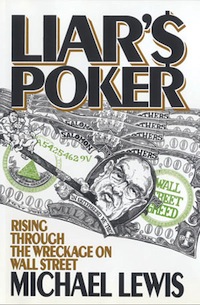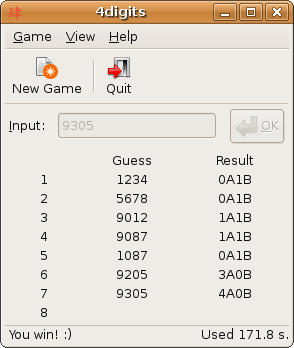
A game show is a genre of broadcast viewing entertainment where contestants compete for rewards. The shows are typically directed by a host, who explains the rules of the game as well as commentating and narrating where necessary. The history of the game shows dates back to the late 1930s when both radio and television game shows were broadcast. The genre became popular in the United States in the 1950s, becoming a regular feature of daytime television.

Red dog, also known as Yablon, is a game of chance played with cards, in which two cards are dealt and a player bets on whether the rank of a third card would fall between them. While found in some land casinos, its popularity has declined, although it is featured at many online casinos.

In the card game of poker, a bluff is a bet or raise made with a hand which is not thought to be the best hand. To bluff is to make such a bet. The objective of a bluff is to induce a fold by at least one opponent who holds a better hand. The size and frequency of a bluff determines its profitability to the bluffer. By extension, the phrase "calling somebody's bluff" is often used outside the context of poker to describe situations where one person demands that another proves a claim, or proves that they are not being deceptive.
A car numberplate game is a car game playable in the United Kingdom and other countries with a suitable car registration scheme, either looking out for a particular number or characteristic of a number plate, or thinking of a word or phrase that corresponds to the letters of the registration. Most are solitary games, however some can be played individually in competition with other passengers.

The United States one-dollar bill (US$1), sometimes referred to as a single, has been the lowest value denomination of United States paper currency since the discontinuation of U.S. fractional currency notes in 1876. An image of the first U.S. president (1789–1797), George Washington, based on the Athenaeum Portrait, a 1796 painting by Gilbert Stuart, is currently featured on the obverse, and the Great Seal of the United States is featured on the reverse. The one-dollar bill has the oldest overall design of all U.S. currency currently being produced. The reverse design of the present dollar debuted in 1935, and the obverse in 1963 when it was first issued as a Federal Reserve Note.

Mia is a simple dice game with a strong emphasis on bluffing and detecting bluff related to Liar's dice.
Liar's dice is a class of dice games for two or more players requiring the ability to deceive and to detect an opponent's deception. In "single hand" liar's dice games, each player has a set of dice, all players roll once, and the bids relate to the dice each player can see plus all the concealed dice. In "common hand" games, there is one set of dice which is passed from player to player. The bids relate to the dice as they are in front of the bidder after selected dice have been re-rolled. Originating during the 15th century, the game subsequently spread to Latin American and European countries. In 1993, a variant, Call My Bluff, won the Spiel des Jahres.

Liar's Poker is a non-fiction, semi-autobiographical book by Michael Lewis describing the author's experiences as a bond salesman on Wall Street during the late 1980s. First published in 1989, it is considered one of the books that defined Wall Street during the 1980s, along with Bryan Burrough and John Helyar's Barbarians at the Gate: The Fall of RJR Nabisco, and the fictional The Bonfire of the Vanities by Tom Wolfe. The book captures an important period in the history of Wall Street. Two important figures in that history feature prominently in the text, the head of Salomon Brothers' mortgage department Lewis Ranieri and the firm's CEO John Gutfreund.

Salomon Brothers, Inc., was an American multinational bulge bracket investment bank headquartered in New York City. It was one of the five largest investment banking enterprises in the United States and a very profitable firm on Wall Street during the 1980s and 1990s. Its CEO and chairman at that time, John Gutfreund, was nicknamed "the King of Wall Street".

Dudo, also known as Cacho, Pico, Perudo, Liar's Dice, Cachito or Dadinho is a popular dice game played in South America. It is a more specific version of a family of games collectively called Liar's Dice, which has many forms and variants. This game can be played by two or more players and consists of guessing how many dice, placed under cups, there are on the table showing a certain number. The player who loses a round loses one of their dice. The last player to still have dice is the winner.
Mexico is an elimination-style dice game, in which several players agree to play a set number of rounds. After each round, one player is eliminated. When all players but one have been eliminated, the remaining player wins the game. Owing to its extremely simple play-structure, it is generally pursued as a method of gambling, whereby the final remaining player wins the amount of money wagered by each person who was eliminated in earlier rounds. A variant of the drinking game liar's dice known as Mexican or Mia uses similar dice rolls, but has very different game mechanics.

Bulls and cows is a code-breaking mind or paper and pencil game for two or more players. The game is played in turns by two opponents who aim to decipher the other's secret code by trial and error.

Poker dice are dice which, instead of having number pips, have representations of playing cards upon them. Poker dice have six sides, one each of an Ace, King, Queen, Jack, 10, and 9, and are used to form a poker hand.
304, pronounced three-nought-four, is a trick-taking card game popular in Sri Lanka, coastal Karnataka, Tamil Nadu and Maharashtra, in the Indian subcontinent. The game is played by two teams of two using a subset of the 52 standard playing cards so that there are 32 cards in play.
In game theory, the traveler's dilemma is a non-zero-sum game in which each player proposes a payoff. The lower of the two proposals wins; the lowball player receives the lowball payoff plus a small bonus, and the highball player receives the same lowball payoff, minus a small penalty. Surprisingly, the Nash equilibrium is for both players to aggressively lowball. The traveler's dilemma is notable in that naive play appears to outperform the Nash equilibrium; this apparent paradox also appears in the centipede game and the finitely-iterated prisoner's dilemma.
Around the world is a card-based drinking game, similar to president, but more complex and at the same time quicker. The game requires one standard (52-card) deck of playing cards. More decks can be added to accommodate additional players and increase difficulty.

Beagle Bag is a collection of video games for the Apple II family of computers published in 1982 by Beagle Bros Software. In common with their other titles, the Beagle Bag software was released in unlocked and unprotected form, and is now in the public domain.
Poker is a popular card game that combines elements of chance and strategy. There are various styles of poker, all of which share an objective of presenting the least probable or highest-scoring hand. A poker hand is usually a configuration of five cards depending on the variant, either held entirely by a player or drawn partly from a number of shared, community cards. Players bet on their hands in a number of rounds as cards are drawn, employing various mathematical and intuitive strategies in an attempt to better opponents.
The Genius: Grand Final is the fourth season of The Genius. It debuted on tvN on June 27, 2015.











